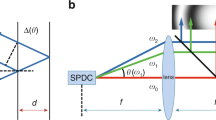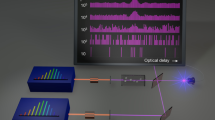Abstract
THE Fabry–Perot interferometer can be used for examining absorption spectra provided that there is no overlapping between successive orders of interference. This means that the range between orders must be equal to, or greater than, the spectral slit-width of the primary monochromator1. Suppose that, using a given interferometer, it is possible to resolve a fraction ▵m of a fringe order, then under the above condition the resolving power of the combination of interferometer and primary monochromator is more than 1/▵m times that of the latter alone.
This is a preview of subscription content, access via your institution
Access options
Subscribe to this journal
Receive 51 print issues and online access
$199.00 per year
only $3.90 per issue
Buy this article
- Purchase on Springer Link
- Instant access to full article PDF
Prices may be subject to local taxes which are calculated during checkout
Similar content being viewed by others
References
Meissner, K. W., J. Opt. Soc. Amer., 32, 185 (1942).
Meyer, C. F., and Levin, A. A., Phys. Rev., 34, 44 (1929).
Barnes, R. B., and Czerny, M., Phys. Rev., 38, 338 (1931).
Author information
Authors and Affiliations
Rights and permissions
About this article
Cite this article
JAFFE, J. An Interference Spectrometer for the Infra-Red. Nature 168, 381–382 (1951). https://doi.org/10.1038/168381a0
Published:
Issue Date:
DOI: https://doi.org/10.1038/168381a0
This article is cited by
-
Fortschritte in Leistungsf�higkeit und Anwendungsm�glichkeit des Fabry-Perot-Interferometers
Die Naturwissenschaften (1957)
-
Extreme Resolution of Infra-Red Absorption Spectra
Nature (1955)
Comments
By submitting a comment you agree to abide by our Terms and Community Guidelines. If you find something abusive or that does not comply with our terms or guidelines please flag it as inappropriate.



